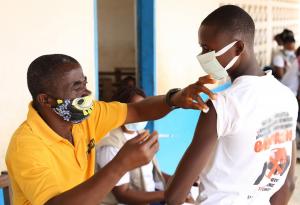Liberia's COVID-19 detection and vaccination drive boosted by Community- Based Response.
Monrovia, 23 June — As Liberia tackled community transmission of COVID-19 in 2022 rapid diagnostic testing of community members in locations where newly confirmed cases were reported proved instrumental in breaking the transmission chains. Additionally, through a reactive vaccination approach, efforts were made to reach out to individuals who had not yet received the vaccine and encourage them to get vaccinated. This approach resulted in 15,463 people being fully vaccinated, contributing 0.4% to the country's overall vaccination coverage of 81% of the population by April 30, 2023.
The Community Based Surveillance and Response (CBSR) re-enforced community engagement by integrating testing, vaccination, case management, contact tracing and addressing misinformation. It also involved the supply of infection prevention kits and home-based isolation and care of confirmed cases.
With support from World Health Organization (WHO), mobile health teams on a total of 162,018 samples in the counties of Montserrado, Nimba, Margibi, and Grand Bassa. From July 15, 2022, to April 30, 2023, a total of 320 cases were confirmed in these counties, with Montserrado having 166 cases, Nimba with 113 cases, Margibi with 18 cases, Lofa with 12 cases, and Grand Bassa with 11 cases. Additionally, 1,682 contacts were followed up, with Montserrado accounting for 558 contacts, Nimba with 807 contacts, Margibi with 160 contacts, Lofa with 56 contacts, and Grand Bassa with 101 contacts. These efforts were focused on the five counties, which collectively house nearly 50% of Liberia's total population.
With the decline in demand for voluntary COVID-19 testing in Liberia, the community-based response initiative enabled monitoring of epidemiological trends to guide control measures.
The initiative, which uses rapid tests to counter the challenge of identifying COVID-19 cases outside health facilities, was launched in Liberia in July 2022.
“Expanding testing in communities using the antigen tests is helping to provide a better way for the country to respond to the pandemic,” says Chea Sanford Wesseh, Assistant Minister for Vital Statistics in Liberia’s Ministry of Health, adding that there are plans to broaden their use beyond the three counties.
In practice, the mobile teams targeted community members in places where newly confirmed cases were reported by administering rapid tests to identify other potential cases. The technology is simple, making it suitable for use in all settings.
Anyone who tests positive and requires treatment is linked to their nearest health facility. In cases where patients are either experiencing mild symptoms or asymptomatic, they are managed under home- based isolation and care, receiving infection prevention and control materials, including information on COVID-19 risk factors and prevention measures such as vaccination and handwashing.
“With testing in communities, we are reaching both the asymptomatic and symptomatic cases. That way we are undertaking timely isolation of confirmed cases leading to a break in the chain of transmission,” explains Dr Monday Julius, the WHO team lead for health emergencies in Liberia.
The positive impact on vaccination uptake contributed to Liberia joining Mauritius, Rwanda and Seychelles as the only four African countries to achieve the 70% global vaccination coverage target by December 2022.
Victoria Dekpah, a student at Nimba University in Liberia, was among those convinced to get vaccinated against COVID-19 when health workers visited her community.
“I didn’t think it was important to test. Many people were afraid of knowing their status and what would happen to them. But after listening to the health worker, I volunteered to take the test and it turned out positive. I isolated myself at home and the health worker visited me regularly until I tested negative again. I also got vaccinated thereafter,” she says.
Isaac Cole, County Surveillance Officer in Nimba, blames rampant misinformation surrounding COVID-19 for the reluctance among Liberians to accept testing and vaccination. But working with local leaders who are trusted by their communities, he says, was the game changer in achieving results.
“The people now know that once they are tested and found to be positive, they will be taken care of either at the health facility or through the home-based care approach. When we go to communities, health workers also lead by example by being vaccinated first, as one of the ways of dispelling myths about vaccination and its effect on the body,” he adds.
WHO has supported 18 other African countries to implement COVID-19 community-based surveillance and response initiative with guidance to use the lessons learnt in implementing this strategy for improving surveillance and response to other epidemic prone diseases.
